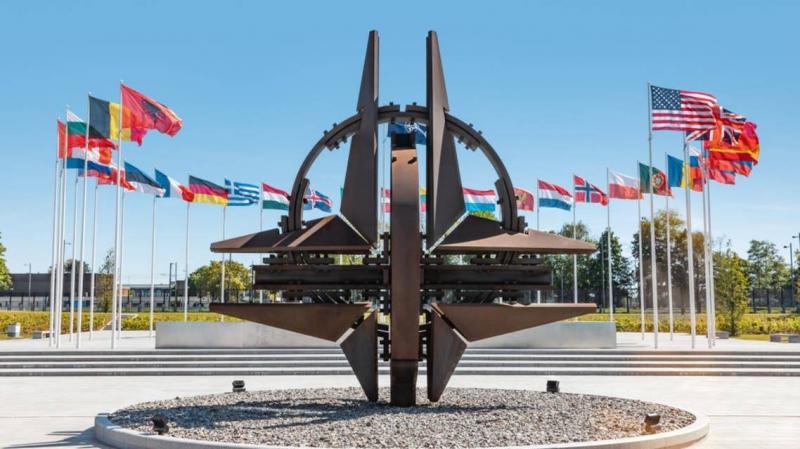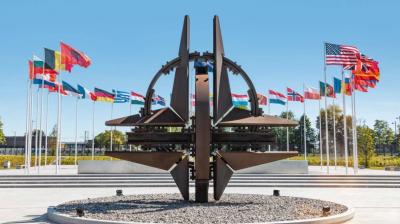Russia has stated that the potential acceptance of Sweden and Finland into the North Atlantic Treaty Organization (NATO) would provoke a strong response from Moscow, which analysts consider to be a threat that complicates matters and may drive both countries to join NATO out of fear of Ukraine's fate, thereby providing an opportunity and gain for the alliance.
The possibility of the two Scandinavian countries joining NATO raises concerns in Moscow, which has expressed through its foreign ministry that such a development would have severe consequences, as the two nations are viewed as "Moscow's backyard." Finland, a former Russian province from 1809 to 1917, shares a 1,300 km border with Russia.
Moscow views the alliance as a strategic threat to its influence in the region and demands that NATO not approach its borders, while NATO defends its open-door policy for new members and the sovereignty of those nations in making such decisions.
According to political analyst Amid Shukri, joining NATO represents an opportunity for the alliance due to the nature and geography of both countries and their military capabilities. Shukri, a senior foreign policy and energy security advisor at the Gulf States Analysis Center (based in Washington), noted that both countries not only have limited existing bilateral defense cooperation but also collaborate in multilateral forums, such as Nordic defense cooperation (NORDEFCO), the European Union, and NATO, both having a strong interest in maintaining stability in the Baltic Sea region.
Shukri pointed out that considering public opinion in both Sweden and Finland, it is unlikely that either country would join the alliance in the foreseeable future unless there are significant changes in relationships between the EU and Russia. This aligns with reports released by the Finnish and Swedish governments in recent years.
He added that Nordic countries play a direct and indirect role in ensuring the security of the Baltic states and that historically, the Baltic states have had very close ties with Nordic countries. Denmark and Norway have played a significant role in developing the military capabilities of the Baltic states since the end of the Cold War, and Sweden and Finland, despite not being NATO members, have a close security relationship with the Baltic states.
He also noted that there are Russian concerns about the United States and NATO's reliance on non-NATO members Sweden and Finland for reliable defense or liberation of the Baltic states. Both Sweden and Finland are important allies for the United States and close partners of NATO. However, neither is obligated to assist any NATO member in the event of armed attack, so the U.S. must plan accordingly.
Shukri emphasized that in light of the war in Ukraine, NATO should support the accession of these countries and send military supplies to counter potential Russian attacks on them, as well as protect the infrastructure of Finland and Sweden against Russian cyberattacks, stressing that Russia cannot easily attack these countries.
On the other hand, Italian political analyst Daniele Rufini considered that the accession of the two countries to NATO is "possible if not certain," pointing to the suggestion by the Finnish Prime Minister that the invasion of Ukraine might increase support for NATO membership in Finland.
He viewed Russia's threat to Finland and Sweden that they would "face military consequences" if they attempted to join NATO as an open threat occurring at a time when Moscow is testing its threats. Rufini stated that "Sweden and Finland feel the Russian pressure, viewing themselves as directly connected to the dynamics that have affected Ukraine, despite clear deep differences. The presence of war in Ukraine and fears regarding where Putin could target next could create a broader situation where the security of Finland and Sweden indeed requires closer relations with the alliance."
Regarding the possibility of Sweden and Finland facing a fate similar to that of Ukraine, he stated, "That would be massive, although it is unpredictable what Putin will do now; an attack on these two countries would be insane, with potential severe consequences. The threats against Finland and Sweden illustrate the broader danger posed by the Putin regime and underline the critical need for a strong and united response to the invasion of Ukraine."
On Friday, Russian Foreign Ministry spokesperson Maria Zakharova stated at a press conference that "all participating countries in the Organization for Security and Co-operation in Europe, including Finland and Sweden, reaffirmed the principle that the security of some countries should not be developed at the expense of the security of others." Zakharova added, "It is clear that the accession of Finland and Sweden to NATO, which is essentially, as you well understand, a military bloc, would have serious military and political consequences that would require our country to take reciprocal steps."
NATO Secretary-General Jens Stoltenberg had previously announced that he had invited Finland and Sweden, which are not members of the organization, to participate in the NATO virtual emergency summit on Friday regarding the situation in Ukraine. Finnish Prime Minister Sanna Marin stated in a parliamentary meeting that the country would be prepared to apply for NATO membership if its national security was raised.
Recently, Sweden has bolstered its military readiness and sent troops and heavy military equipment to Gotland, its largest island, strategically located in the Baltic Sea, just 330 kilometers from Kaliningrad, the base of the Russian Baltic Fleet.
In 2019, recognizing a lack of critical military capabilities and an inability to defend itself against a Russian attack, Sweden decided to increase its military spending by about 40%, with a budget increase of 27.5 billion Swedish kronor (3.1 billion dollars) by 2025.
In contrast, Finland, which shares a lengthy land border with Russia, has not stopped investing in its defense capabilities. It recently sought to purchase 64 F-35 fighter jets for 9.5 billion dollars to replace its current, aged combat aircraft. Former Finnish Foreign Minister Erkki Tuomioja noted that Finland could mobilize reserve forces comprising 280,000 trained soldiers, which no other country in Europe can claim.




